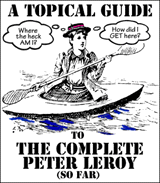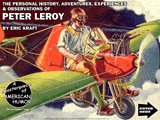
by Mark Dorset
Ralph Waldo Emerson:
We call the beautiful the highest, because it appears to us the golden mean, escaping the dowdiness of the good, and the heartlessness of the true.
Ulrich, in Robert Musil’s The Man Without Qualities:
“Extract the meaning from all poetic works, and what you will have is a denial, not complete of course, but an endless series of individual examples that are based on experience, negating all valid rules, principles, and prescriptions on which society is based, the very society that is so fond of these poetic works.
“Ultimately a poem, and the mystery of it, cuts the meaning of the world clear, where it is bound fast to thousands of ordinary words, cuts it loose, and so makes it into a balloon that goes floating up and away.
“If we call that beauty, as it is usual to call it, then we ought to see that beauty is an unspeakably ruthless upheaval, far more cruel than any political revolution ever was.”
Volume II, “The Like of It Now Happens (II)”
Hermann Broch:
For earth-bound man beauty and truth are only accessible in the form of single beautiful or true phenomena. A scientist who puts no more than his own love of truth into his research does not get very far; he needs, rather, an absolute dedication to the object of his research, he needs logic and intuition; and if luck (which plays a rather more important part than the idea of truth in such cases) is in his favour, truth will appear all by itself when his work or his experiments come to an end. The same is true of the artist. He, too, has to subject himself unconditionally to the object; his capacity to listen to the secret voice of the object (independently of the fact that it presents itself as an exterior or interior object), to seek out the laws that it obeys—think of Durer’s experiments with perspective, or Rembrandt’s experiments with light—does not depend on-the artist’s love of beauty. His truth, like the scientist’s, is, on the contrary, a ripe fruit that he will pluck from the successful work. And yet why are the scientist and the artist driven onwards incessantly by the whip of obsession for the object? What causes this love of exploration? Is it perhaps the terra incognita of what exists that fascinates him? No: the truly unknown cannot seduce him; he is seduced only by what is just beginning to be sensed: the man who can foresee a new shred of reality must manage to formulate it, so as to be able to make it exist. In science and art alike the important thing is the creation of new expressions of reality, and if this process is interrupted not only would there be no more art or science, but man himself would also disappear, since he differs from animals precisely because of his capacity to discover and create something new. The artist who limits himself merely to a search for new areas of beauty creates sensations, not art. Art is made up of intuitions about reality, and is superior to kitsch solely thanks to these intuitions.
in Gillo Dorfles, Kitsch: The World of Bad Taste
Milan Kundera:
Music taught the European not only a richness of feeling, but also the worship of his feelings and his feeling self. After all, you are familiar with this situation: the violinist standing on the platform closes his eyes and plays the first two long notes. At that moment the listener also closes his eyes, feels his soul expanding in his breast, and says to himself: “How beautiful!” And yet he hears only two notes, which in themselves could not possibly contain anything of the composer’s ideas, any creativity, in other words any art or beauty. But those two notes have touched the listener’s heart and silenced his reason and aesthetic judgment. . . . Music: a pump for inflating the soul. Hypertrophic souls turned into huge balloons rise to the ceiling of the concert hall and jostle each other in unbelievable congestion.
Miguel de Cervantes:
Oh the power of this bitter-sweet god, as we call him in our unthinking way, and how truly he enslaves us, and with what little respect he treats us! Here is Andrés, a noble and intelligent young man, brought up almost all his life at court and spoiled by his rich parents, and all of a sudden he’s changed to the point of deceiving his servants and friends, disappointing the hopes which his parents had for him, leaving the road to Flanders, where he would have been able to put to use his bravery and increase the honour of his family, and throwing himself at the feet of a girl, to be her lackey—a girl who, beautiful as she was, was a gipsy after all. Oh, the privilege of beauty, which rides rough-shod over and drags even the most fancy-free along the ground by the hair!
Peter Leroy:
Beauty was my pump of choice, the ultimate blow job. It filled me with helium and nitrous oxide, lifting gas and laughing gas, lifted me out of time for a while, and filled me with joy. So I sought beauty. I relished it; it blew me up; I was, as the song says, a fool for it. I sought it in art and music and sunsets and moonlight. Some people said that the capacity for being amazed and delighted by beauty resided in “the soul,” so I supposed that I had begun to develop a very fine soul, and I seemed to feel it swelling in my chest when under the influence of beauty.
However, at some point toward the end of my adolescence I became embarrassed by my affection for beauty and by my tendency to become so quickly and fully inflated in the presence of it. I felt that I was in danger of becoming an aesthete, one of those people who is inflated by his own marvelous susceptibility to inflation, one, ultimately, who inflates himself, a blowfish.
So I trained myself to play the cynic in the presence of beauty. I sneered at it and at the swooning blimps who rhapsodized about it and at the inflationary works that pumped them full of it.
SEE ALSO:
Herb ’n’ Lorna: “intoxicated by beauty”
E-mail it to me, Mark Dorset.

 Here
are a couple of swell ideas from Eric Kraft's vivacious publicist, Candi
Lee Manning:
Here
are a couple of swell ideas from Eric Kraft's vivacious publicist, Candi
Lee Manning:
